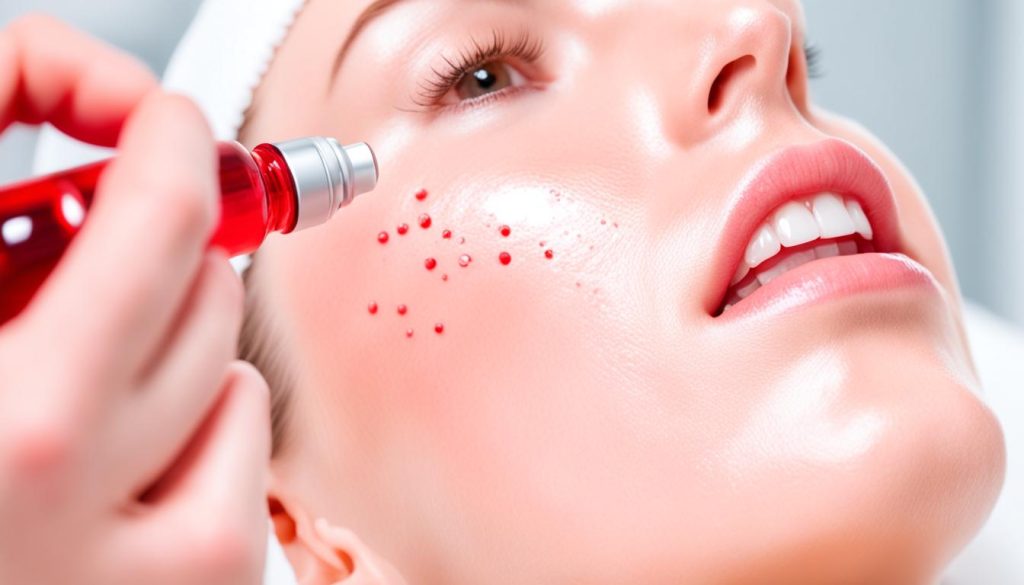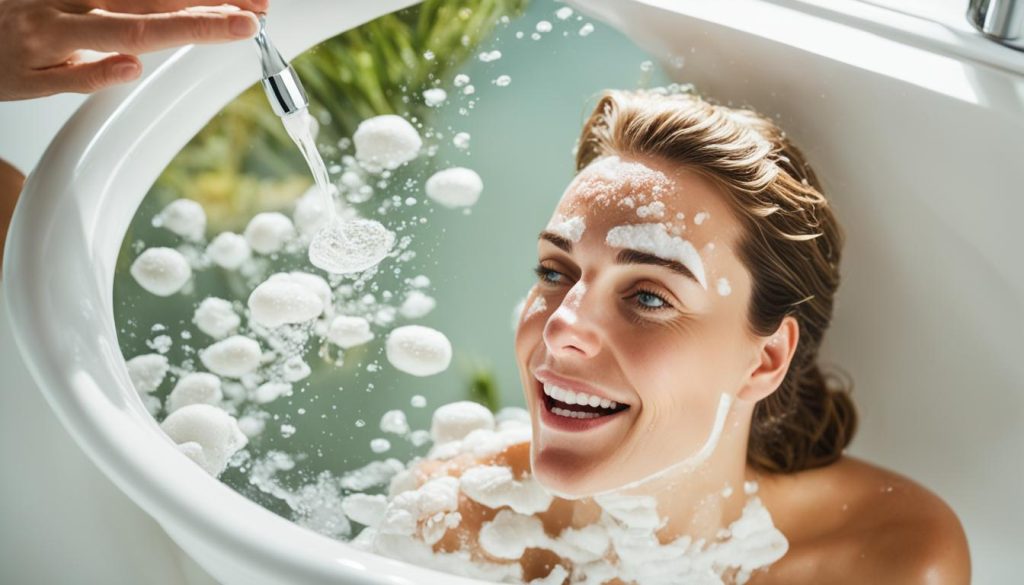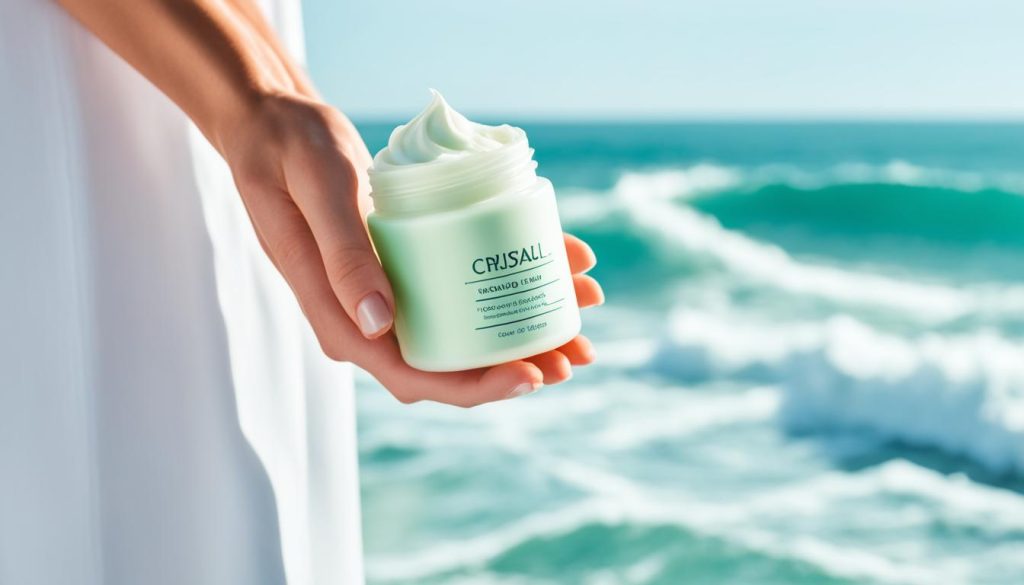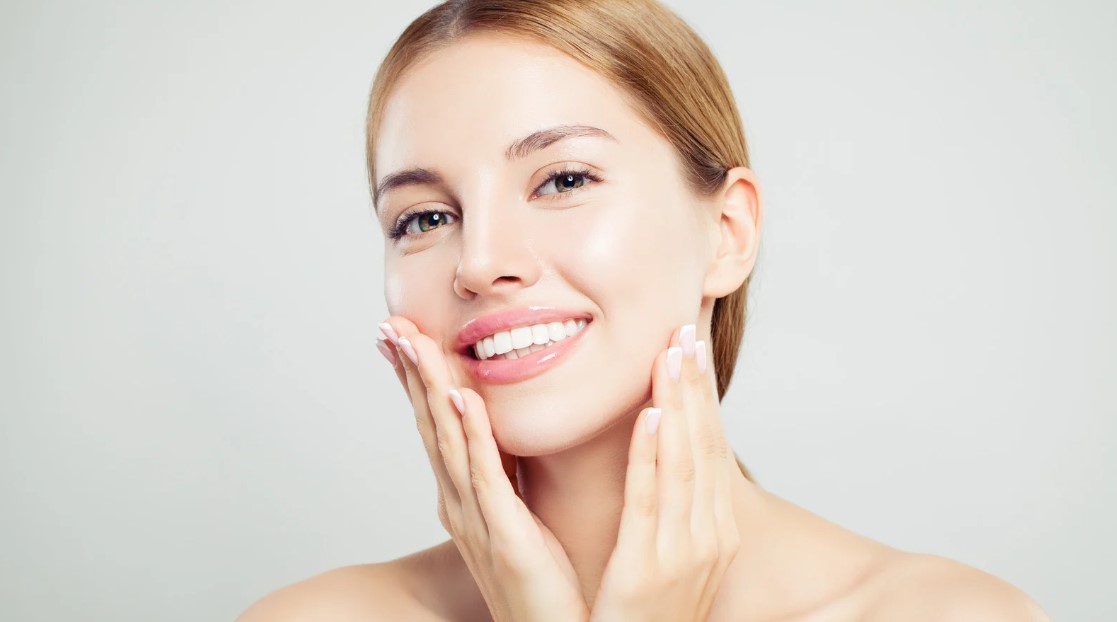Are you tired of dealing with acne and blemishes? Achieving clear skin may seem like an elusive goal, but with the right skincare routine and products, you can bid farewell to those pesky imperfections.
When it comes to getting clear skin, there are no shortcuts or instant fixes. It’s all about adopting effective strategies and incorporating the right products into your daily routine. So, let’s dive into some essential tips and natural remedies on how to get clear skin.
How to Get Clear Skin?
Avoid Popping Pimples
Popping pimples can have detrimental effects on your skin. It disrupts the body’s natural healing process and increases the risk of additional breakouts and permanent scarring. To maintain the health and appearance of your skin, it’s crucial to avoid popping pimples and adopt alternative strategies for addressing acne issues.
Instead of picking at your pimples, focus on preventive measures and targeted treatments to prevent acne breakouts and minimize the risk of scarring. Here are some effective alternatives to popping pimples:
- Keep the area clean: If a pimple drains on its own, make sure to keep the area clean by gently washing it with a mild cleanser. This helps to prevent infection and minimize inflammation.
- Apply topical treatments: Choose skincare products containing ingredients like benzoyl peroxide or salicylic acid that are known for their acne-fighting properties. These treatments can help reduce existing pimples and prevent new ones from forming.
- Use spot treatments: Spot treatments are formulated to target individual pimples without causing harm to the surrounding skin. Look for products that contain ingredients like tea tree oil or sulfur, as they have antimicrobial properties that can help kill acne-causing bacteria.
- Consult a dermatologist: If you’re struggling with persistent acne or severe breakouts, it’s essential to seek professional advice. A dermatologist can recommend personalized treatment options to address your specific skin concerns and prevent long-term damage.
By avoiding the temptation to pop pimples and adopting these alternative strategies, you can effectively manage acne breakouts and minimize the risk of permanent scarring. Remember, patience and consistency are key when it comes to achieving clear and healthy skin.

Wash Twice Daily
One of the most important steps in maintaining clear skin is washing the face regularly. Washing the face twice daily helps prevent acne and keeps the skin clean and refreshed. It is particularly crucial to cleanse the skin after sweating to remove sweat and excess oil that can clog pores and contribute to breakouts.
Benefits of Washing Twice Daily
Washing the face twice daily offers several benefits for maintaining clear skin:
- Cleanses the skin: Regularly washing the face helps remove dirt, oil, and impurities that accumulate throughout the day, preventing them from clogging pores and leading to acne.
- Prevents acne breakouts: By washing the face twice daily, you can minimize the buildup of oil, sweat, and bacteria on the skin, helping to prevent acne breakouts.
- Refreshes the skin: Washing the face in the morning and evening provides a refreshed and revitalized sensation, leaving the skin feeling clean and ready for the day or night ahead.
How to Wash the Face Properly?
To ensure effective cleansing and prevent irritation, follow these steps when washing the face:
- Wet the face with lukewarm water.
- Apply a gentle cleanser suitable for your skin type.
- Gently massage the cleanser onto the skin using circular motions, focusing on areas prone to acne.
- Rinse thoroughly with lukewarm water, ensuring that no residue of cleanser remains on the skin.
- Pat the skin dry with a clean towel. Avoid rubbing the face vigorously, as it can cause irritation and redness.
- Follow up with a suitable moisturizer to hydrate and protect the skin.
Recommended Products for Washing the Face
Choosing the right products for washing the face is crucial to maintain clear skin. Look for gentle cleansers that are specifically formulated for your skin type, whether it’s oily, dry, or combination skin. Here are some popular options:
| Cleanser | Suitable Skin Types | Description |
|---|---|---|
| Cetaphil Gentle Skin Cleanser | All skin types | A mild, non-irritating cleanser that effectively removes impurities without stripping the skin of its natural moisture. |
| The Ordinary Squalane Cleanser | All skin types | A gentle cleanser enriched with squalane to effectively cleanse and moisturize the skin, leaving it soft and supple. |
| La Roche-Posay Effaclar Foaming Gel Cleanser | Oily, acne-prone skin | A foaming gel cleanser that gently removes excess oil, dirt, and impurities while maintaining the skin’s natural balance. |
| CeraVe Hydrating Facial Cleanser | Dry, sensitive skin | A hydrating cleanser that replenishes the skin’s moisture barrier while effectively removing dirt, oil, and makeup. |

Remember that washing the face twice daily, particularly after sweating, is essential for preventing acne and maintaining clear, healthy skin. Choose a gentle cleanser suited to your skin type and follow the proper washing technique to ensure optimal results.
Avoid Touching the Face
One of the most important habits to cultivate for clear skin is avoiding touching the face. When you regularly touch your face with dirty hands, you unknowingly deposit dirt, oils, and bacteria onto your skin. These impurities can clog your pores and lead to breakouts and acne.
To prevent breakouts and keep your skin clean, make a conscious effort to avoid touching your face throughout the day. This includes resisting the urge to pick at pimples or scratch itchy areas. By refraining from touching your face, you help maintain the natural balance of your skin and reduce the risk of introducing harmful bacteria.
| Benefits of Avoiding Touching the Face |
|---|
| Prevents breakouts |
| Minimizes the transfer of dirt and bacteria |
| Helps maintain clean and clear skin |
To break the habit of touching your face, you can try the following techniques:
- Keep your hands busy with other activities, such as holding a stress ball or fidgeting with a pen.
- Wear gloves or use hand sanitizer to create a physical barrier between your hands and face.
- Avoid resting your chin or cheeks on your hands when sitting or lying down.
- Practice mindfulness and increase self-awareness to catch yourself when you’re about to touch your face.
Remember, a simple change in behavior can make a significant difference in the health and appearance of your skin. By avoiding touching your face, you can prevent breakouts, minimize the transfer of dirt and bacteria, and keep your skin clean.
Moisturize
Moisturizing is an essential step in any skincare routine. After washing your face, using a suitable moisturizer helps to restore hydration, control sebum production, and prevent damage to the skin.
The key to effective moisturizing is finding the right product for your specific skin type. Different skin types have different needs when it comes to hydration. Here are some recommendations for suitable moisturizers:
- For dry skin: Look for moisturizers with ingredients like hyaluronic acid and ceramides that provide long-lasting hydration and help to repair the skin’s moisture barrier.
- For oily skin: Opt for oil-free and lightweight moisturizers that won’t clog pores or contribute to excess oiliness. Look for ingredients like niacinamide and salicylic acid, which can help regulate sebum production.
- For combination skin: Choose a moisturizer that is hydrating enough for dry areas of the face but doesn’t feel heavy or greasy on oily areas. Look for products labeled as “noncomedogenic” to prevent clogged pores.
Using a moisturizer not only keeps your skin hydrated but also helps to create a protective barrier against environmental stressors. It can also improve the overall texture and appearance of your skin, leaving it looking healthy and radiant.

Always Wear Sunscreen
Protecting your skin from the sun’s harmful UV rays is essential for preventing skin damage and maintaining healthy skin. A key step in any skincare routine is wearing sunscreen.

Wearing sunscreen with a minimum SPF of 30 provides effective protection against both UVA and UVB rays. SPF (Sun Protection Factor) measures the level of protection sunscreen offers against UVB rays, which are primarily responsible for sunburn. Choosing a broad-spectrum sunscreen ensures that you are protected from both UVA and UVB rays, preventing skin damage and reducing the risk of skin cancer.
It is important to apply sunscreen generously to all exposed areas of the skin, including the face, neck, arms, and legs. Don’t forget easy-to-miss areas like the ears, lips, and the back of your hands. Apply sunscreen at least 30 minutes before going outside to allow it to fully absorb into the skin and provide maximum protection.
To maintain the effectiveness of sunscreen, remember to reapply it every two hours, especially if you are spending extended periods of time outdoors or sweating heavily. Swimming or towel-drying can also remove sunscreen, so be sure to reapply after these activities as well.
By consistently wearing sunscreen, you can lower your risk of sunburn, prevent premature aging, and reduce the likelihood of developing skin cancer. Make sunscreen a daily essential in your skincare routine to protect your skin and maintain a healthy, youthful complexion.
Focus on Gentle Products
Gentle products are essential for maintaining the health and comfort of sensitive skin. By using gentle skincare products, you can avoid irritation and ensure that your skin remains calm and balanced. When selecting products for sensitive skin, it is important to look for options that are specifically formulated to address the unique needs of this skin type.
Choosing Suitable Options for Sensitive Skin
When it comes to sensitive skin, it’s best to avoid products that contain harsh chemicals, fragrances, or potential irritants. Instead, opt for gentle alternatives that are specifically designed to soothe and nourish delicate skin. Alcohol-free, fragrance-free, and non-comedogenic products are excellent choices for sensitive skin.
Keeping Brushes and Sponges Clean
Aside from using gentle products, it’s also crucial to keep your skincare tools clean to prevent irritation and minimize the risk of breakouts. Dirty brushes and sponges can harbor bacteria and dirt, which can lead to skin irritation and blemishes. Regularly cleaning your brushes and sponges ensures that they are free from any buildup and allows for a fresh and hygienic application.
| Benefits of Using Gentle Products for Sensitive Skin | Best Practices for Keeping Brushes and Sponges Clean |
|---|---|
|
|
Conclusion
Achieving clear skin requires a consistent skincare routine and the use of suitable products. By following these tips, you can maintain healthy and blemish-free complexion and achieve glowing skin.
To start, avoid popping pimples as it disrupts the body’s natural healing process and increases the risk of additional pimples and scarring. Additionally, washing your face twice daily and after sweating helps prevent acne breakouts and keeps the skin clean.
Moisturizing is essential for controlling sebum production and protecting the skin from damage. Choose moisturizers suitable for your skin type, always opting for oil-free and noncomedogenic options. Moreover, don’t forget to wear sunscreen with at least SPF 30 to shield your skin from harmful UV rays. Apply sunscreen 30 minutes before going outside and reapply every 2 hours.
Lastly, focus on using gentle products, especially if you have sensitive skin. Avoid irritants such as alcohol and fragrance, and opt for noncomedogenic options. It’s also important to keep your brushes and sponges clean to prevent irritation and breakouts. Managing stress is crucial for maintaining healthy skin, as stress can trigger acne breakouts and other skin issues.

